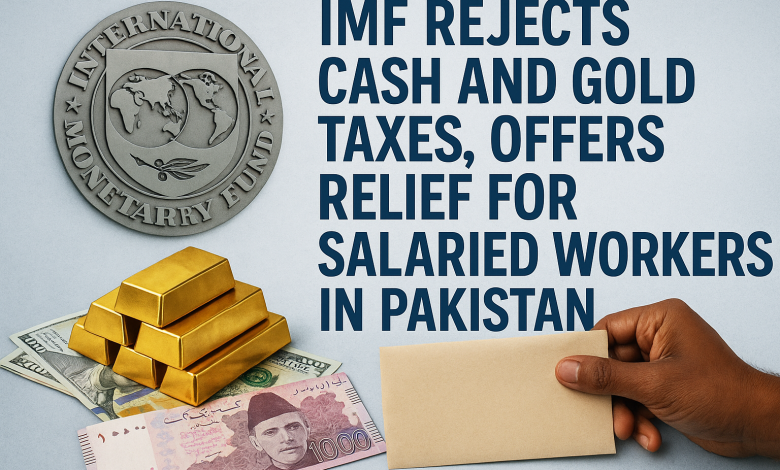IMF Rejects Cash and Gold Taxes, Offers Relief for Salaried Class in Pakistan

As Pakistan prepares to unveil its federal budget for the fiscal year 2025-26 on June 10, recent developments in negotiations with the International Monetary Fund (IMF) have brought significant changes to the proposed fiscal policies. The IMF has agreed to provide tax relief for the salaried class while rejecting the government’s proposal to impose taxes on movable assets such as cash and gold.
Relief for the Salaried Class
In a move aimed at easing the financial burden on middle-income earners, the IMF has consented to Pakistan’s proposal to reduce income tax rates across various salary slabs. This decision is expected to benefit millions of salaried individuals who have been grappling with high inflation and economic challenges.
Key aspects of the proposed tax relief include:
- Increased Tax-Free Income Threshold: The annual tax-free income threshold is set to rise from Rs600,000 to Rs1 million, effectively exempting monthly salaries up to Rs83,000 from income tax.
- Reduced Tax Rates Across Slabs: For instance, individuals earning Rs100,000 per month may see their tax rate halved from 5% to 2.5%, while those earning Rs183,000 could experience a reduction from 15% to 12.5%.
These measures are anticipated to provide a relief of approximately Rs56–60 billion to the salaried class, offering much-needed respite amid economic pressures
Rejection of Taxes on Cash and Gold
Conversely, the IMF has rejected the government’s proposal to impose a Capital Value Tax (CVT) on movable assets, including cash and gold. The rationale behind this decision is the IMF’s emphasis on focusing taxation efforts on income rather than wealth, to avoid discouraging savings and investment.
Additionally, the IMF dismissed a controversial proposal to levy a Federal Excise Duty on day-old chicks, citing concerns over targeting specific industries without broadening the tax base.
Approval of Digital Services Tax
To compensate for the revenue shortfall resulting from the tax relief measures, the IMF has approved the introduction of a digital services tax. This new levy is expected to generate approximately Rs10 billion in revenue and reflects a shift towards taxing the digital economy.
Further discussions are underway regarding increasing the tax on mutual fund dividends and withholding tax on interest income from 15% to 20%, as well as withdrawing income tax exemptions for venture capital companies and the cinema industry.
Budget Presentation and Economic Outlook
The federal government is set to present the full budget in the National Assembly on June 10, with the Economic Survey scheduled for release on June 9. The upcoming budget, estimated at Rs17.68 trillion, will place a strong emphasis on austerity measures and economic reforms aimed at stabilizing the economy.
These developments underscore the government’s commitment to balancing fiscal responsibility with measures that support its citizens, particularly the salaried class, amid ongoing economic challenges.
